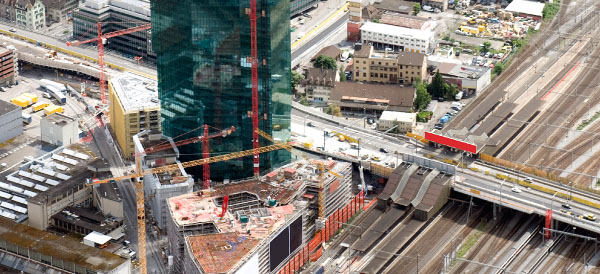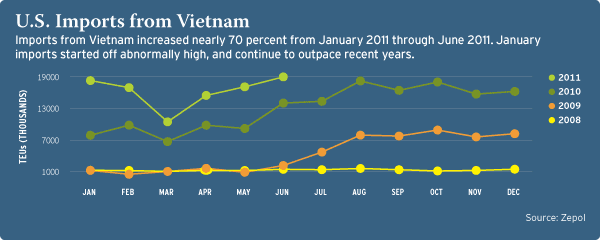Global Logistics—September 2011

Swiss Attraction? Bank On It
Even as Europe’s economic prospects remain mired in uncertainty, Switzerland continues to attract foreign investment. To date in 2011, "the island of stability" scored a number of new and expanded investment opportunities.
"By mid-year, at least 24 projects from North America landed in Switzerland, generating an estimated $625 million in investment and leading to about 1,737 new jobs," says Daniel Bangser, director, North America for Switzerland Trade & Investment Promotion. Among those projects:
- Newell-Rubbermaid established a new EMEA headquarters in Geneva.
- Hewlett-Packard opened a Cloud Service Center in Zurich.
- Nestlé/General Mills’ joint venture, Cereal Partners Worldwide, built an Innovation Center in Orbe.
- KAYAK opened a European headquarters in Zurich.
- J.P. Morgan increased its private banking team in Geneva from 650 to more than 1,000, and doubled its staff in Zurich.
- Johnson & Johnson acquired Swiss medical devices maker Synthes, valued at more than $21 billion.
- Google expanded in Zurich, adding 300 employees at its development center.
- Staples entered a strategic alliance with Swiss office products company Büro Schoch Direct AG.
- Dow Chemical expanded its packaging facility in Horgan.
- Hasbro opened a new administrative building in Delémont.
- Philip Morris selected Neuchatel for its European research site.
"Switzerland is often mentioned as a low-tax country," explains Bangser. "But an Osec Business Network Switzerland study reveals that taxes rank 11th in a list of factors why foreign companies set up operations there. Political stability, legal security, quality of life, social climate, purchasing power, and transport and logistics make up the first five."
Getting Ready for The Panama Canal, Mon
U.S. ports aren’t the only authorities freshening their sails and brushing a new coat of paint on terminal operations in expectation of a container surge following the Panama Canal expansion.
French container shipping carrier CMA CGM Group recently signed a memorandum of understanding (MOU) for the operation, equipment, and expansion of the Gordon Cay Container Terminal in the Jamaican port of Kingston, for a minimum of 35 years. The MOU marks the start of a major investment program before the terminal is fully commissioned in 2015 – a year after the Panama Canal’s expansion is complete.
The project to widen the Panama Canal will require a major shipping reorganization, particularly in the Caribbean and North America region. The new Panamax vessels, with capacities up to 12,500 TEUs, will be able to cross the Canal, compared to the current limit of 4,000 TEUs. Transport distribution will only be possible from a hub that can accommodate these giants, which is currently not the case for most ports in the Caribbean and on the U.S. East Coast.
Developing a central hub in Kingston will allow CMA CGM to take full advantage of these changes.
Deflation Key To Asian Growth
Inflation remains the chief economic hurdle for Asia, and the impact of the global economic slowdown is not sharp enough to constitute a major threat to growth moving forward, according to the Asian Development Bank.
The Manila-based financial institution adds that containing inflation should remain an economic priority, but that central banks generally have it under control.
With U.S. and European currencies – notably the euro – dropping to new lows, there has been concern in China that slowing exports as a result of rising costs and decreasing purchasing power could have a negative effect on the country’s economic prospects.
Europe is a top target for Chinese-manufactured goods, and the strength of the euro has historically helped China hold down the value of its currency and make exports cheaper and more attractive. The yuan is linked to the U.S. dollar, and the weak dollar has helped both the yuan and the euro retain their value.
A declining euro, however, would mean a stronger dollar and a higher yuan.
Irish Lorry Worry
In an emerging dispute reminiscent of the U.S.-Mexico cross-border impasse, Irish truckers and their trailers are being impounded at west coast UK ports over government complaints that haulers are operating illegal cabotage (cargo carriage between two points within a country by a vehicle registered in another country).
Many Irish trucking companies send unaccompanied trailers to ports in Liverpool, Fishguard, Pembroke, and Holyhead. Irish drivers stay overnight near the ports, then pick up trailers the next day. The UK government claims British carriers should collect the trailers.
"It doesn’t make sense for Irish drivers to keep going back and forth when they know they will have more loads for Britain," explains Eoin Gavin, president of the Irish Road Haulage Association (IRHA). "The stay in the UK also acts as an official break from working hours."
The IRHA is lobbying the Irish government to persuade Westminster to classify the four relevant ports as international so that existing cabotage rules will not apply. Currently, an Irish motor freight carrier is allowed to make three journeys in the United Kingdom – but any trip involving a UK port is considered one of those trips.
If the ports were classified as international, collection from and drop-off at a port would not be seen as a domestic movement.
UK Port Tips Wind Power
The Port of Hartlepool recently called upon the UK government to clarify its renewable energy policy in an effort to establish British ports as centers of excellence and innovation in wind energy development.
The northeast England port, which is part of the PD Ports Group, says it is imperative that the government has a direct, clear, and positive view of the renewable energy sector, including Renewables Obligation Certificates (ROCs), funding, and planning.
"There is a major reluctance to invest in this sector until the government sets the level for ROCs, which will determine the proportion of power UK electricity suppliers must generate from renewable sources," says David Robinson, CEO, PD Ports Group. "Government delay in specifying the ROC level causes great uncertainty in the market and does not give international companies clear incentive to invest in UK facilities."
Despite these restrictions, the Port of Hartlepool is already building a reputation as a center of wind energy excellence. The port is home to JDR Cable Systems, a cable manufacturer for renewable energy projects, and Heerema Fabrication Group, which fabricates complex structures for the offshore oil, gas, and energy industries.

